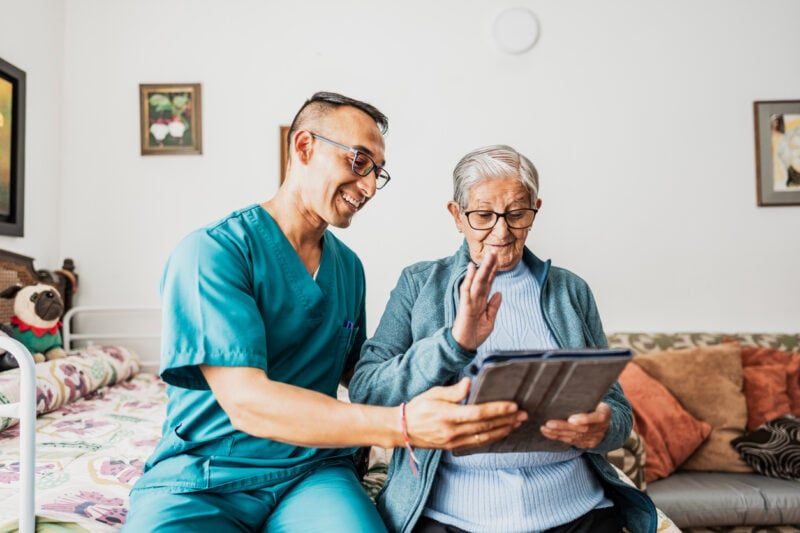Can’t see the video player? View the video here.
What does ageism in health care look like? It can be a thoughtless quip that makes an older person feel diminished. Or an assumption that patients are unable to follow a conversation or make their own decisions. Maybe it occurs when a concern is voiced, then discounted or dismissed.
Ageism is reflected in care strategies that ignore a patient’s values and ideas about what constitutes a productive life. Too often, attitudes such as “these patients are old and near the end anyway” or “there’s not much we can do to help them” prevail.
Ageism is not new, but the covid pandemic brought it shockingly into view. In its early days, the virus was shrugged off as something of concern mostly to older people, with some arguing they were expendable if the alternative was shutting down the economy. In the grave months that followed, many who died in nursing care were dehumanized in news reports that showed body bags piled outside facilities. To date, about 80% of those who have died of covid-19 have been older adults, including nearly 140,000 nursing home residents — a population beset by understaffing, inadequate infection control and neglect.
KHN and The John A. Hartford Foundation held a web event Thursday. Judith Graham, KHN’s Navigating Aging columnist, hosted the discussion. She was joined by:
- Dr. Louise Aronson, a geriatrician, professor of medicine at the University of California-San Francisco and author of “Elderhood.”
- Dr. Michael Wasserman, a geriatrician, advocate for vulnerable older adults during the pandemic and leader of the public policy committee of the California Association of Long Term Care Medicine.
- Dr. Javette Orgain, a family physician and medical director for Longevity Health Plan of Illinois, which serves nursing home residents; former president of the National Medical Association, which represents African American physicians and their patients; and former assistant dean of the University of Illinois-Chicago’s Urban Health Program.
- Dr. Rebecca Elon, a geriatrician and caregiver for her mother, who has dementia, and husband, who died earlier this year.
- Jess Maurer, a lawyer and executive director of the Maine Council on Aging, which promotes an anti-ageism pledge.

—
Previously Published on khn
You Might Also Like These From The Good Men Project
 Compliments Men Want to Hear More Often
Compliments Men Want to Hear More Often  Relationships Aren’t Easy, But They’re Worth It
Relationships Aren’t Easy, But They’re Worth It  The One Thing Men Want More Than Sex
The One Thing Men Want More Than Sex  ..A Man’s Kiss Tells You Everything
..A Man’s Kiss Tells You Everything Join The Good Men Project as a Premium Member today.
All Premium Members get to view The Good Men Project with NO ADS.
A $50 annual membership gives you an all access pass. You can be a part of every call, group, class and community.
A $25 annual membership gives you access to one class, one Social Interest group and our online communities.
A $12 annual membership gives you access to our Friday calls with the publisher, our online community.
Register New Account
Log in if you wish to renew an existing subscription.
Username
First Name
Last Name
Password
Password Again
Choose your subscription level
- Yearly - $50.00 - 1 Year
- Monthly - $6.99 - 1 Month
Credit / Debit Card PayPal Choose Your Payment Method
Auto Renew
Subscribe to The Good Men Project Daily Newsletter By completing this registration form, you are also agreeing to our Terms of Service which can be found here.Need more info? A complete list of benefits is here.
—
Photo credit: iStock
The post Confronting Ageism in Health Care appeared first on The Good Men Project.
Original Article










